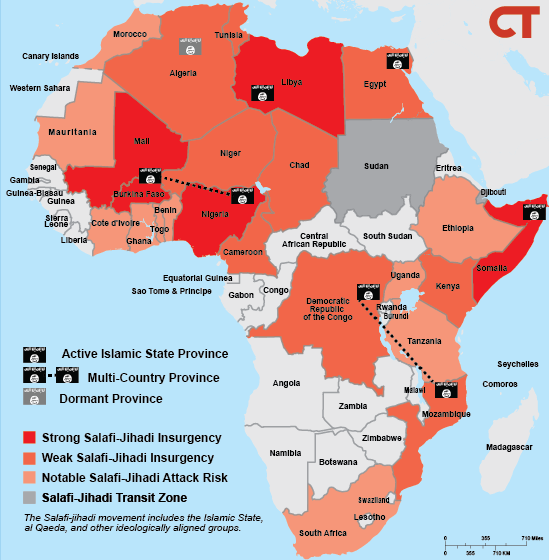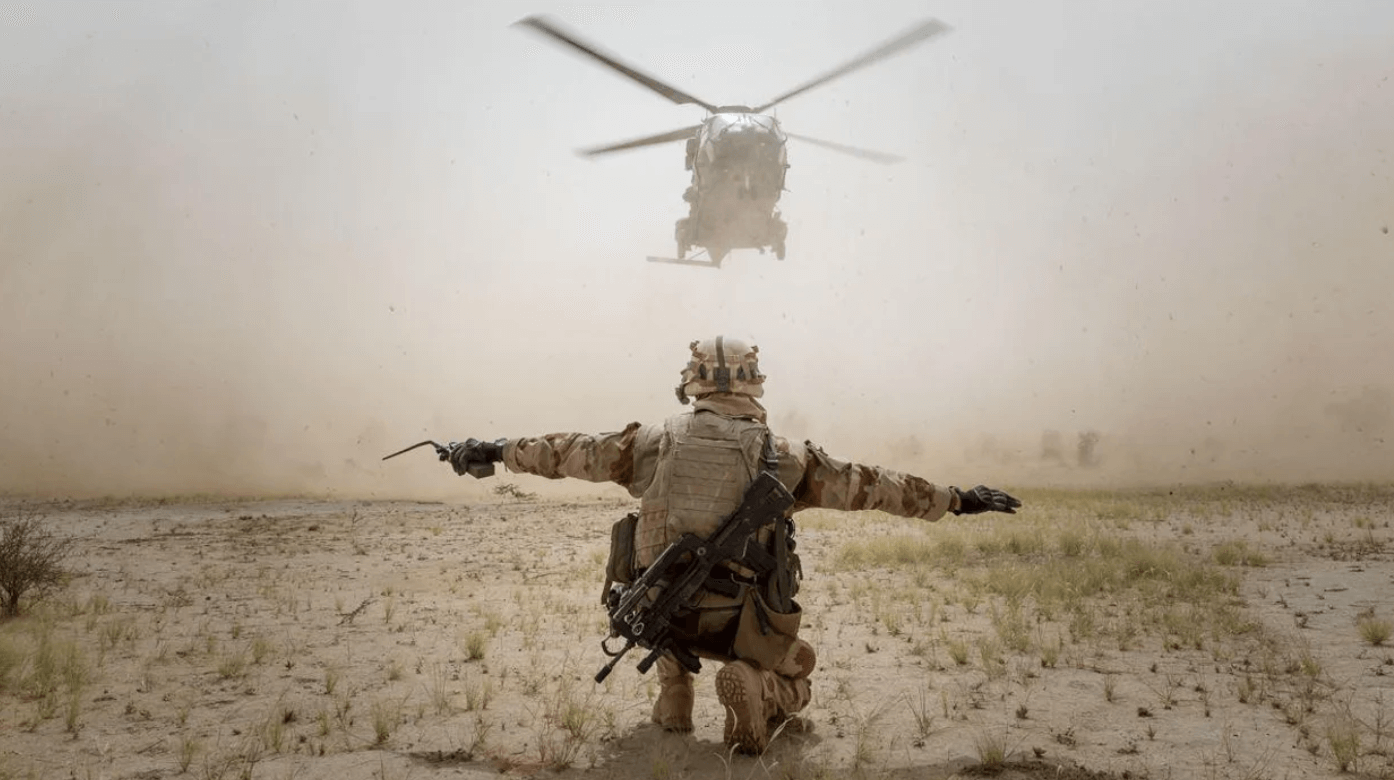On May 8, 11 Egyptian soldiers were killed and five others wounded in a gunfight with Islamic State (ISIS) terrorists in the Sinai Peninsula. Seven days later, ISIS claimed responsibility for another attack that killed five Egyptian soldiers in the same region.
ISIS attacks have also been reported in other African countries like Libya, Mali, Burkina Faso, the Democratic Republic of Congo, Niger, Nigeria, Togo, and Cameroon. In fact, attacks have been increasing and growing in intensity for over a year. In fact according to Jihad Analytics, an open-source intelligence and data analysis site, half of ISIS’ strikes this year have been in Africa. “For the first time in the history of the jihadi group, Iraq is no longer the country where ISIS claims the highest number of operations,” the site notes.
Since the beginning of the year, the Islamic State has conducted half of its attacks in #Africa. For the first time in the history of the jihadi group, Iraq is no longer the country where #IS claims the highest number of operations: the group #ISWAP is now more active in Nigeria. pic.twitter.com/ivlV92DQJo
— Jihad Analytics (@Jihad_Analytics) April 8, 2022
According to the Global Terrorism Index 2022, the Islamic State and its affiliates “have shifted their focus to sub-Saharan Africa and the Sahel region” as the conflict in Syria has subsided. To this end, sub-Saharan Africa accounted for 48% of global terrorism deaths in 2021; a large number of these deaths were caused by ISIS.
The primary reason behind ISIS’ resurgence in Africa is the lack of or dwindling foreign military support. For instance, the 85-member Global Coalition to Defeat Daesh (the Arabic acronym for ISIS), which was formed in 2014, is mostly active in Iraq and Syria. The coalition does not mention Africa once on its activities page on its website and solely focuses on operations in Iraq, Syria, and the “broader Middle East.” Hence despite calling itself global, the coalition has focussed only on one particular region so far.
Also Read: Why Terrorist Groups Don’t Die
The coalition’s lack of initiative to tackle extremism in Africa has left a security vacuum in many countries in the continent, which has contributed to the terrorist group’s comeback. For instance, the coalition’s relentless airstrikes in ISIS-held areas in Iraq and Syria from 2014 to 2019 and its intensive training of Iraqi security forces and Syrian Kurdish militias have been extremely successful in reducing ISIS from a dominant military force to a group of covert splinter cells. In contrast, the grouping has largely ignored Africa’s growing Daesh problem.
In fact, the coalition only very recently recognised that tackling extremism in Africa is crucial to thwarting ISIS’ global expansion. Last week, the coalition convened in Africa (Morocco) for the first time since its formation and denoted ISIS’ presence in Africa as a major threat. In this respect, it called on partners to emulate the successful methods used against Daesh in Iraq and Syria.

Adding to the continent’s security woes, France, which has for years maintained a military presence in West Africa and the Sahel region, has recently indicated that it will be pulling out its forces from Mali owing to disagreements with the military junta. Experts have argued that France’s withdrawal would not create a “new security vacuum” in the Sahel, since Mali is considered a regional hub for Islamist extremism. This, they argue, will embolden violent groups like ISIS to stage more attacks and capture more territory, further destabilising the region. Therefore, even though France has that it will redeploy troops to other Sahel countries, the instability induced by its withdrawal from Mali could easily spread to neighbouring countries like Burkina Faso and Niger.
Since 2012, through operations like Serval and Barkhane, France has been able to keep extremism in the Sahel largely under check via frequent military raids, airstrikes, and training of local forces. Therefore, a sudden withdrawal will put a decade-long effort in jeopardy and set the stage for groups like ISIS to launch frequent attacks.
Recent examples of military withdrawals have proved this point. The US pulling out of Afghanistan last year enabled the Taliban to seize control of the country and has emboldened ISIS to conduct more attacks. Similarly, the US withdrawal of troops from Somalia and halting of airstrikes have to an increase in suicide bombings by Al Shabaab.
In fact, French President Emmanuel Macron acknowledged the threat of French withdrawal from Mali precipitating an Afghanistan-like collapse back in February, when he first announced the move.
Also Read: The Taliban is in a Catch-22 Situation With ISIS-K and the West
Several other factors have also expedited Daesh’s resurrection in the continent and continue to contribute to its growth. For instance, it has exploited rampant poverty as a major recruitment tactic. For example, in Egypt’s Sinai, where security forces have been trying to keep extremists at bay, Daesh has preyed on the people’s anger and frustration over poor living conditions and a lack of effort by the government to initiate development projects.
This instability, which is in plentiful supply across the region, provides a fertile breeding ground for a terrorist group that was born during conflict. This explains why countries like Mali, Burkina Faso, Libya, and Guinea have seen a rise in ISIS attacks. Moreover, terrorist groups tend to proliferate where economic opportunities can be exploited. A case in point is the Gulf of Guinea region, which is a major energy trade hub and a site of significant maritime traffic. As a result, piracy has taken root in the Gulf, and countries bordering the Gulf have seen a spike in ISIS attacks. Nigeria, for instance, has witnessed over 160 ISIS attacks so far this year, more than Iraq.
By failing to recognise the expanding strategy of the group, the international community has allowed ISIS to prey on vulnerable countries, particularly in Africa. Therefore, the success of training, support, and development initiatives rests on no longer treating ISIS as a threat only in Iraq and Syria, given the group has ambitions of establishing a ‘global’ Islamic caliphate and has carried out deadly attacks in the US, Europe, and Asia.

